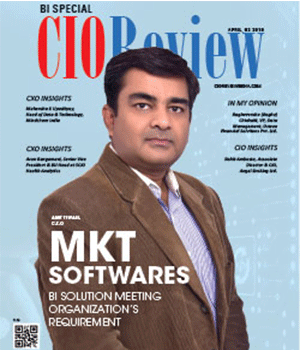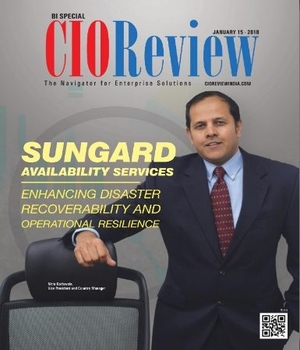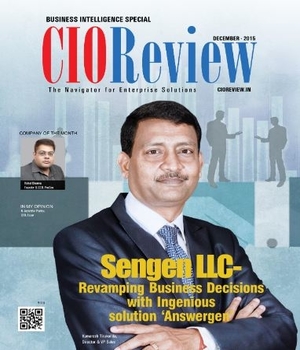
Cloud ERP, the new mainstream
Hitendra Shinde, Business Head- India, Blue Star Infotech
Enterprise resource planning remains the most important part of business system. Ever since the advent of full-scale enterprise resource planning (ERP) systems in the early 1990s, companies have struggled to balance the systems’ high costs and complexity against the need for customized features and flexibility. Given the trade-offs involved, companies must carefully evaluate whether a cloud-based ERP system is the right choice. The two key factors that stand out from all the others: implementation size and system complexity. These issues take on different intensities depending on whether the company is implementing an ERP solution for the first time, migrating from its current ERP system, or extending its current system’s capabilities to include additional functionality.
The rapid rise of mobility in enterprises is creating a newer set of software development tools and frameworks. The integration of Big Data and analytics is being driven by the need of companies to manage the masses of data they create.
Cloud has also boosted the adoption of multi-tier ERP systems, these act as an add-on to the standalone or centralised ERP solution. This model allows firms to keep an on-premise ERP strategy at centralised locations and have cloud-based ERP solutions for strategic business units. The growing traction has led to established ERP vendors to team up with cloud-based ERP vendors in order to offer two/multi-tier ERP services. This is apparent with Oracle and NetSuite. While some basic service like HR, CRM which may have limited impact on an organisation have been moved to cloud, enterprises are still not confident of moving their core ERP solutions supporting financials or supply chain management to cloud.
Implementing ERP is a high-cost, multi-year, complex project for many organizations and the success rate of ERP has been as low as 60 percent in many countries. ERP till date has been hosted and implemented on –premise at the client location. However, the question remains is cloud suitable for all enterprises irrespective of their company size, business complexities or security needs?
Gartner report Predicts 2014: The Rise of the Postmodern ERP and Enterprise Applications World, Gartner predicts that by 2018, at least 30 percent of service-centric companies will move the majority of their ERP applications to the Cloud.
Benefits of moving your ERP to Cloud
1. Cost – Cloud based ERP services are provided on pay-as-you-go model and it reduces the initial upfront capital expenditure of purchasing the software. This helps the CFOs to turn the ERP cost from Capex to Opex
2. Ease of deployment – Traditional ERP takes months and often years to configure the system and make the company ready to implement the ERP solution, whereas cloud-based ERP systems have ready frameworks that drastically reduces the time required to GO LIVE.
3. Flexibility & Scalability – Cloud allows to add new features and business functionalities easily into the software without going through the traditional challenges of buying or configuring new software add-ons.
4. Easy upgrades and access to latest software – Companies that have adopted ERP on Cloud can easily take the advantages of upgradations or enhancements in the system or whenever the service provider launches a new version without the cost or hassle associated with upgrading on-premise ERP software.
5. Free Maintenance - Companies, who have adopted hosted ERP solution, don’t need to run their own software and hardware, thus getting rid of regular maintenance costs.
6. Better Integration Through Other Systems - The cloud has been purposefully created for simple interoperability that complements the option for present or future utilization of extra products.
7. Data Back-Ups – Third party cloud service providers takes utmost measures to ensure that there is no data loss. They provide better data security and disaster recovery plans.
Challenges of Moving your ERP to Cloud
1. Ensuring Data Security – Moving this data to cloud means less control of the enterprise on their data, exposure of the sensitive data to third party vendors.
2. Limited customizations & integrations – Cloud may not be suitable for enterprises which needs highly tailored ERP packages to match their complex business processes. Also organisations with legacy ERP may face multiple challenges in integrating individual applications and data to support business processes.
The complexity of any ERP system is measured along three dimensions: the extent of integration, the amount of functionality, and the size of the footprint. Corporate environments that require basic functionality, minimal customization, and limited integration are particularly appropriate for cloud-hosted solutions. ERP in the cloud is the future, and even companies that have good reason not to take the plunge yet should be monitoring developments and considering their longer-range plans.
CIO Viewpoint
Why Foolproof Facial Recognition Is Key Against...
By Joseph Sudheer Thumma, Global CEO & MD, Magellanic Cloud
National Technology Day 2025: Powering Progress...
By CIOTech Outlook Team
Aligning IT Roadmap with Business Objectives: A...
By Subhash singh Punjabi, CISO & Head Enterprise Architecture, Deepak Fertilisers & Petrochemicals Corporation Ltd
CXO Insights
Three ESG Strategies for Sustainable Business...
By Jyotsna Beliappa, Founder and Director, BlueSky Sustainable Business
Importance of Data Driven reporting & Decision...
By Ketan Karkhanis, Head of Information Technology, Hikal
Pursuit of Actionable Insights Driving Data...












